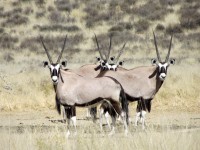Since I made contact with Astri Leroy (from the Spider Club of South Africa) in connection with the spider web photo I took the other day, she’s sent me some spider-related material. Astri is very concerned about the bad rap that spiders get. In one of her emails (after I asked how many poisonous spiders we have where I live), she says “Really to set your mind at rest, very few spiders in any part of South Africa pose any danger to people at all, and in the last 60 – 100 years no deaths from spider bites have been recorded.” 60 – 100 years? Does that mean that in those 40 years there were some unaccounted for deaths?! 😉
She also sent me the following excerpt from an article she has written.
A Note on Venom by Astri Leroy
Most spiders produce venom which is a mixture of saliva, venom and digestive fluids, used to subdue, kill and digest their prey – usually invertebrates. In general it has little effect on large mammals including people. A bite may hurt at first, can itch for several days but if left to subside without being scratched will disappear with no lasting ill effects. Venom does not persist in the body and the effects of a bite will not recur later. Spiders will only bite if squashed against our skin – they don’t even bite in self-defence as some larger creatures do. They do not eat people. They do not make a living from sucking our blood and are not vectors of any human diseases. In fact they will avoid contact with big, dangerous creatures like us. This means that spider bites are really rare and the effect venom of most spiders on humans is unknown because they simply don’t and often cannot bite us.
Many supposed spider bites turn out to be tick, flea, mosquito or other arthropod bites, but most often they are bacterial infections. Fungal infections or lesions resulting from some underlying medical condition are also sometimes blamed on spiders. People with impaired immune systems are more susceptible to infections and such infections often cannot be diagnosed so medical practitioners take the cautious route of prescribing broad spectrum antibiotics. These work for most bacterial infections with the exception of the difficult to treat deep seated bacterial infections such as MRSA (methicillin-resistant Staphylococcus aureus). Of course antibiotics do not work on fungal or viral infections and need to be treated differently.
However, she does admit that what is known in South Africa as the Brown Button Spider (Latrodectus geometricus), and elsewhere as the Brown Widow Spider, has always been common in our area. Great! Just what I needed to hear. A venomous spider in my area.
So, if you see a spider with that very “spider-like” shape (like they use in movies and comic books) and an hourglass marking underneath (Like I’m really going to be turning a spider like this over to check!), or you see a spider egg sac that has spines on it, DO NOT TOUCH. Call the branch of your local Spider Club instead!




















Great post, Lisa–and I love the title! Thank God you’re helping spread the word about spider safety and the news that venom is, for the most part, not something that will kill–at least not in the last 60 to 100 years. I don’t know about you, but I’m relieved!
By the way, I don’t know if there’s a local spider association here in Haiti–but I promise to do my part to mobilize the masses on behalf of the sadly-overlooked spider population here in Port-au-Prince!
Thanks Kathryn! Yes, I’m doing my bit for spider education. Glad to hear you’ll join in from your side of the world.
The thing is, that even if a spider bite isn’t fatal, it can be really nasty. A while back I saw photos of the effect of a Violin spider bite on a man’s hand (he caught the spider, so it was *definitely* a spider bite). It wasn’t pretty!
Hi there Spiderwoman!
So have you joined the Spider Club then? You are sharing some very interesting stuff here. How protective do you think spiders are of their egg sacs?
I’m using my size to intimidate the smaller spiders – made a lot of noise last night to keep one away from my bed – but they don’t scare easy. In general I keep a good distance from them (I think they run faster than the bigger ones), so you won’t find me tickling any spider bellies either 😉
No, I haven’t joined The Spider Club . . . yet. But maybe I’ll become their roving reporter from the Southern Cape! 😉
I really don’t know how protective spiders are of their eggs sacs – and I don’t intend to find out!
Spiders are lucky to have Astri – and now you – as their spokesperson! Interesting stuff, Lisa – can’t say I’ve studied spiders too closely! I don’t have an issue with them, but they’re not really part of my social circle!
Sunshine
Hi! Thanks for coming by today. It looks pretty busy over at your site!
I’m not sure that I’m as convinced of this spiders-really-don’t-mean-us-any-harm thing as Astri is! I feel about spiders almost like I feel about sharks: If they can harm us, why wouldn’t they?! But the info she’s been sending me has made me feel better about all the spiders that live in our house and garden i.e. I’ll let them stay.
I love how in the article she mentions that spiders don’t eat people. That made me laugh!
Good information, though. Even knowing this, I might still cry a little if I see a big African spider. Spider eggs sack with spines on it?? Shiver.
Yes, she’s very keen for people to think kindly of spiders!
You do realize that Africa doesn’t have the monopoly on big spiders?! 😉
I’m not sure how hard those spines on the Button spiders egg sacs are. Guess they can’t be too soft because what purpose would they have then?
You are right. An uncle of mine, who lived in Texas years ago, had a tarantual crawl across his chest one night. And actually, I only saw little spiders when I was in Africa. I think I just have old ideas stuck in my head!